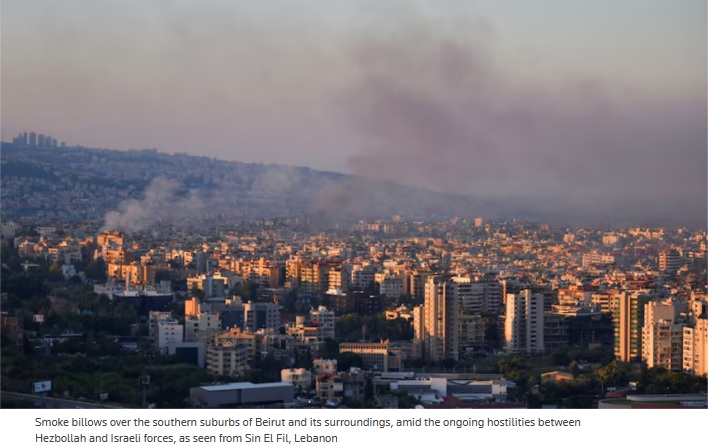Israel launched an airstrike on Hezbollah’s intelligence headquarters in Beirut, assessing damage after a series of attacks on senior figures within the group. Iran’s Supreme Leader dismissed these strikes as ineffective and vowed not to back down. The escalation follows an earlier missile attack by Iran, itself a response to Israeli military action in Lebanon. This heightened tension has caused oil prices to rise amid concerns about potential strikes on Iranian oil facilities, as Israel seeks to weaken Hezbollah in Lebanon and Hamas in Gaza.
The recent airstrike is part of a broader assault that has displaced over 1.2 million Lebanese. Among those targeted was Hashem Safieddine, the likely successor to Hezbollah leader Sayyed Hassan Nasrallah, who was killed by Israel a week ago. While Safieddine’s status remains unclear, no official comment has been made by Israel or Hezbollah. In the southern suburbs of Beirut, blasts were reported, prompting evacuation alerts for residents in several neighborhoods.
Hezbollah claimed that Israeli forces were attempting to infiltrate the southern Lebanese town of Odaisseh, with ongoing clashes reported. Meanwhile, U.S. President Joe Biden stated that Israel has yet to decide how to respond to Iran’s actions, while dismissing speculation that Israeli Prime Minister Netanyahu might be attempting to influence the upcoming U.S. election.
Also Read: Iran Issues Warning to Israel Amid Rising Tensions
Lebanon’s government has condemned the Israeli strikes, accusing them of killing civilians, including women and children. Israel maintains that it targets military installations and blames Hezbollah and Hamas for using civilians as human shields. The U.S. State Department confirmed the death of an American citizen, Kamel Ahmad Jawad, in Lebanon, sparking alarm and calls for Israel to take precautions to prevent civilian casualties.
The conflict stems from an October 7 attack by Hamas militants that killed 1,200 Israelis and led to hostages being taken. Since then, Israel’s retaliatory strikes on Gaza have killed over 41,000 Palestinians, leading to allegations of genocide, which Israel denies. Cross-border tensions have also escalated, with rockets fired from Lebanon into Israel.
Iranian Supreme Leader Ayatollah Ali Khamenei vowed that Iran would not relent in its support for Hezbollah and other allies in the region, framing the conflict as a just fight against Israel. He urged regional resistance movements to increase their efforts, warning that any attack on Israel would benefit the Middle East. Iranian officials further warned that if Israel retaliates, Iran would target its energy infrastructure.
Israel confirmed that its airstrikes targeted Hezbollah’s intelligence headquarters and claimed responsibility for the death of Mohammad Rashid Sakafi, head of Hezbollah’s communication networks. However, it has not commented on whether Safieddine was killed.
Buildings in Hezbollah-controlled southern Beirut have been reduced to rubble, with widespread destruction reported. The Islamic Health Authority, linked to Hezbollah, reported that 11 medics were killed in Israeli attacks in southern Lebanon. Israel claims its strikes have targeted weapons depots and command centers.
Iran’s Foreign Minister Abbas Araqchi, visiting Beirut, expressed support for a ceasefire in Lebanon if Hezbollah agreed, tying it to a broader ceasefire in Gaza.
News Source Reuters



